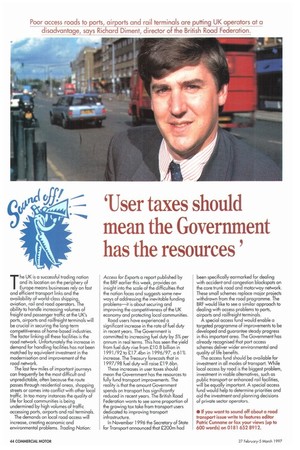'User taxes should mean the Goverment has the resources
Page 46

If you've noticed an error in this article please click here to report it so we can fix it.
The UK is a successful trading nation and its location on the periphery of Europe means businesses rely on fast and efficient transport links and the availability of world-class shipping, aviation, rail and road operators. The ability to handle increasing volumes of freight and passenger traffic at the UK's ports, airports and railfreight terminals will
be crucial in securing the long-term . competitiveness of home-based industries. The factor linking all these facilities is the road network. Unfortunately the increase in demand for handling facilities has not been matched by equivalent investment in the modernisation and improvement of the road network.
The last few miles of important journeys can frequently be the most difficult and unpredictable, often because the route passes through residential areas, shopping streets or comes into conflict with other local traffic. In too many instances the quality of life for local communities is being undermined by high volumes of traffic accessing ports, airports and rail terminals. The demands on local road access will increase, creating economic and environmental problems. Trading Nation: Access for Exports a report published by the BRF earlier this week, provides an insight into the scale of the difficulties that the nation faces and suggests some new ways of addressing the inevitable funding problems—it is about securing and improving the competitiveness of the UK economy and protecting local communities. Road users have experienced a significant increase in the rate of fuel duty in recent years. The Government is committed to increasing fuel duty by 5% per annum in real terms. This has seen the yield from fuel duty rise from £10.8 billion in 1991/92 to £17.4bn in 1996/97, a 61% increase. The Treasury forecasts that in 1997/98 fuel duty will raise £19.6bn. These increases in user taxes should mean the Government has the resources to fully fund transport improvements. The reality is that the amount Government spends on transport has significantly reduced in recent years. The British Road Federation wants to see some proportion of the growing tax take from transport users dedicated to improving transport infrastructure.
In November 1996 the Secretary of State for Transport announced that £200m had been specifically earmarked for dealing with accident and congestion blackspots on the core trunk road and motorway network. These small schemes replace major projects withdrawn from the road programme. The BRF would like to see a similar approach to dealing with access problems to ports, airports and railfreight terminals. A special access fund would enable a targeted programme of improvements to be developed and guarantee steady progress in this important area. The Government has already recognised that port access schemes deliver wider environmental and quality of life benefits. The access fund should be available for investment in all modes of transport. While local access by road is the biggest problem, investment in viable alternatives, such as public transport or enhanced rail facilities, will be equally important. A special access fund would help to determine priorities and aid the investment and planning decisions of private sector operators.












































































































